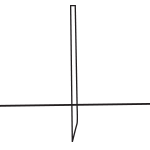Physical properties of soil
Your plants will have difficulty growing if the soil is too compact. Roots have to work much harder in that case and overall growth and productivity will suffer. In addition, it is difficult for water to percolate through compact soil.
Measuring soil compaction
Make your own penetrometer by using a square-sided, wooden and pointed tomato stake. Using a mallet or a large stone, knock the stake into the ground until it becomes almost impossible to go deeper without a great deal of effort. Mark the stake with a pen at soil level and repeat this process at a range of locations in your garden. These could include a well-dug vegetable patch, a lawn or beneath fruit trees. It’s impossible to say what depths are good or bad. This test is best for comparing sites or for monitoring how your soil improves over time if you add organic matter as described in Section 5.

Project 1
There is no ‘perfect’ measure of soil compaction but common sense tells us that the deeper the stake goes into the soil the better. For example, we would expect the soil below an old fruit orchard to be better than a heavily-trodden lawn.
How Does Your Garden Grow Kit
This unique kit is based on research carried out in the Bio-Protection Research Centre at Lincoln University in association with the BHU Organics Trust and Kings Seeds. The kit will help you to discover a number of important things such as the acidity of your soil (slightly acid for potatoes, slightly alkaline for brassicas) and how to attract bees to your crops and ladybirds to eat your pests.
